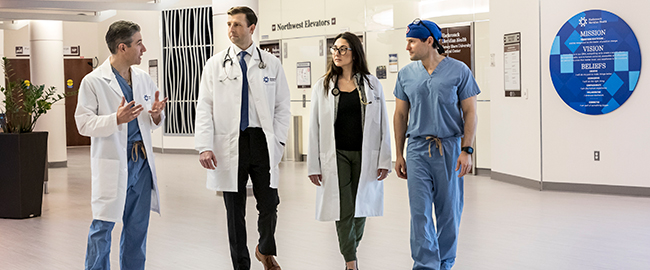Structural and Congenital Heart Disease
Congenital heart disease is a defect of the heart’s chambers, valves or blood vessels present at birth. The abnormal heart structure disrupts the normal flow of blood through the heart.
While heart defects may be diagnosed in the womb or immediately after birth, some heart defects may not show until later in life.
Our experts provide the most innovative treatments and lifelong management of your congenital heart disease or structural heart condition, helping you live a full and healthy life.
Symptoms of Structural and Congenital Heart Disease
- Irregular heartbeat (arrhythmia)
- Blue coloring of the skin, lips or fingernails
- Feeling out of breath and exceptionally tired during or after physical exertion
- Fluid buildup in the lungs and shortness of breath
- Swelling in the neck, abdomen, lower legs and feet
Types of Conditions We Treat
The valve in the aorta, the major artery in the heart, is narrow and doesn’t open and close properly.
One or both flaps of the mitral valve bulge backwards when the heart contracts, causing some blood to flow backwards.
The heart has a hole in the wall between the upper chambers.
Narrowing of the aorta affects blood flow to the lower part of the body.
The opening in the mitral valve is narrow, restricting blood flow.
The heart has an opening in the wall between the upper chambers which should have closed during newborn development.
The heart has an opening in the wall between the lower chambers.
How are Structural and Congenital Heart Conditions Diagnosed?
Our cardiologists use one or more non-invasive cardiac diagnostic tests such as electrocardiography (Echo or EKG) to diagnose heart defects.
You may undergo a state-of-the-art minimally invasive diagnostic test including cardiac catheterization or electrophysiology. Often, we can diagnose and treat congenital heart conditions at the same time, without requiring invasive surgery.
Innovative Valve and Structural Heart Surgery
Our doctors are pioneers in the latest procedures to treat structural and congenital heart conditions. You may be a candidate for a minimally invasive procedure even if you’ve been told surgery is not an option for you. These innovative techniques result in less pain, a shorter hospital stay and a quicker recovery. Our state-of-the-art hybrid operating rooms give surgeons the flexibility to perform robotic-assisted and minimally invasive procedures, with the ability to use open-surgery when needed.
The MitraClip is guided by the surgeon through a catheter to the heart. It is deployed and grasps the leaflets of the mitral valve to improve valve closure and reduce the backflow of blood. We were among the first hospitals in New Jersey to use the MitraClip.
During Transcatheter Aortic Valve Replacement (TAVR), the surgeon guides a tiny medical device through a catheter to the damaged heart valve. The device is then deployed to repair or replace the heart valve. This approach offers unprecedented outcomes, with faster recovery and better outcomes than traditional open heart surgery.
The WATCHMAN™ LAAC Device reduces the risk of stroke in patients with atrial fibrillation not related to a valve problem. The device closes off the left atrial appendage of the heart and keeps harmful blood clots from entering the bloodstream. The left atrial appendage is the source of more than 90 percent of stroke-causing blood clots that come from the heart in people with non-valvular atrial fibrillation. By blocking this area, the risk of stroke may be reduced and, over time, you may be able to stop taking warfarin.
Minimally invasive and open valve surgeries include:
- Aortic valve repair and replacement (including TAVR)
- Combined valve, coronary and atrial fibrillation surgery
- Complex mitral valve repair and replacement
- Minimally invasive aortic and mitral valve surgeries
- Pulmonic valve surgery
Additional Treatments for Structural and Congenital Heart Disease
We offer the full range of advanced treatments for structural and congenital heart disease. Our team can recommend the most effective approach for your condition, which may include:
Electrophysiology: Minimally invasive techniques such as catheter ablation and implantable cardiac devices.
Interventional cardiology: Image-guided, minimally invasive procedures such as angioplasty with stent placement and valvuloplasty.
Cardiac rehabilitation: Medically supervised program that helps patients recover from surgery, adopt a healthy lifestyle and prevent serious heart problems in the future.
Heart failure and pulmonary hypertension care: Coordinated treatment and support from a team of cardiologists, nurses, physical therapists and dietitians.
Heart surgery: Unique heart and valve procedures such as minimally invasive transcatheter aortic valve replacement (TAVR) and WATCHMAN™ Left Atrial Appendage Closure (LAAC) Device.
Convenient Access to Expert Heart Care
Hackensack Meridian Health offers Structural and Congenital Heart centers at Hackensack University Medical Center and Jersey Shore University Medical Center. Our patients have access to innovative surgical procedures at these two major academic medical centers, as well as highly coordinated treatment and cardiac rehabilitation services through our integrated network of hospitals located close to home.









